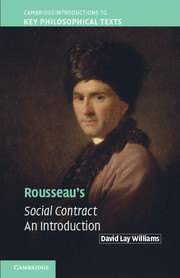Chapter 5 - Conclusion
Published online by Cambridge University Press: 05 June 2014
Summary
It requires little labor to demonstrate Rousseau’s originality and importance in the tradition of political philosophy. These have been accepted among political thinkers virtually from the day he began writing on the subject. His most celebrated contemporaries, such as Voltaire and Adam Smith, engaged his work in various ways and to varying degrees, even where they and many others disagreed on the merits of his contributions. This has remained true in recent decades across all methodological approaches and substantive doctrines. John Rawls characterized his Theory of Justice as continuing the social contract tradition established in Locke, Rousseau, and Kant; Jacques Derrida dedicated an entire book to understanding the relationship of politics and language in Rousseau’s works; Isaiah Berlin described Rousseau as the progenitor and archetype of a major and influential mode of political liberty; some have suggested that Rousseau offers the essential underpinnings of Ernesto Laclau, Chantel Mouffe, and other recent radical democrats; Jürgen Habermas credits Rousseau with inventing the very idea of “public opinion,” and with properly celebrating liberty and equality; Leo Strauss situates him as the pivotal “second wave” of modernity, sweeping away ancient commitments to natural law; Sheldon Wolin identifies Rousseau as the key force keeping communitarianism alive in the modern age; Charles Taylor has presented Rousseau as a crucial figure in the development of the modern individual and central to the story of the secularization of the West; Robert Dahl cites Rousseau as an important (though imperfect) early advocate of democratic inclusion. It is difficult to discuss any major theme in political philosophy today without acknowledging Rousseau’s role in its development.
- Type
- Chapter
- Information
- Rousseau's Social ContractAn Introduction, pp. 216 - 244Publisher: Cambridge University PressPrint publication year: 2014

